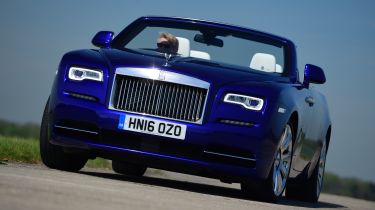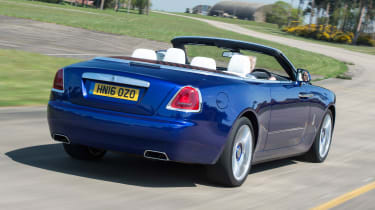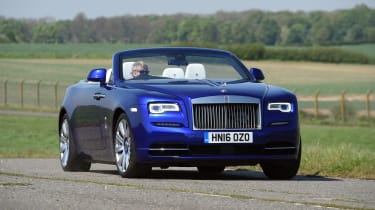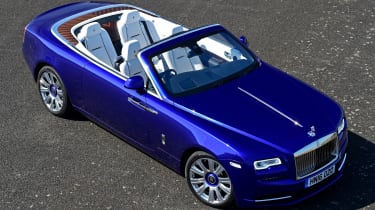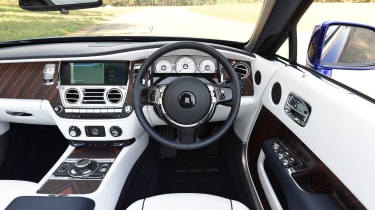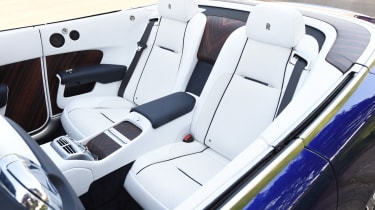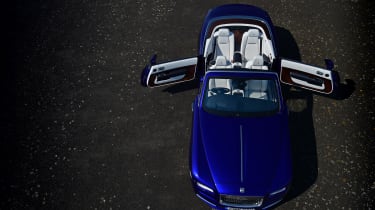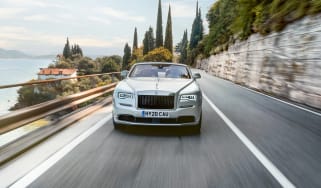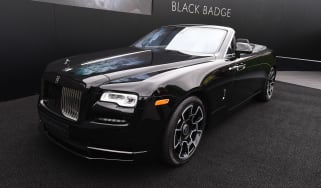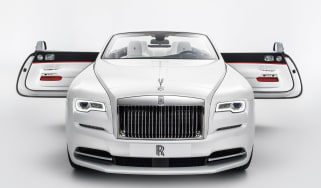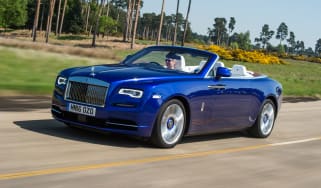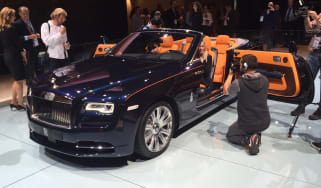Rolls-Royce Dawn review
The Rolls-Royce Dawn is the brand’s most opulent and extravagant drop-top ever, but such luxury doesn’t come cheap

The Rolls-Royce Dawn is the brand’s most luxurious, most desirable, and most dynamic drop-top to date. It’s essentially a convertible version of the Wraith coupe, and is available with a list of options longer than your arm.
• Best convertible cars to buy now
Despite its colossal footprint, the Dawn is actually considered smaller than the Phantom Drophead Coupe, which ceased production in 2016. It’s only the manufacturer’s third convertible in 50 years, tracing its ancestry back to the Rolls-Royce Cornice of 1966.
There’s only one bodystyle, one engine and one trim, but that shouldn’t disappoint as every model comes loaded with luxury kit – as well as a 563bhp 6.6-litre turbocharged V12. That huge powerplant is actually a detuned version of the 624bhp unit found in the Wraith, but a sizeable 780Nm (down from 800Nm in the coupe) of torque ensures progress is swift.
Costing more than £250,000, the Dawn doesn’t really have any direct rivals, but those considering one will likely have plenty of other expensive cars already in their garage. A Mercedes S-Class Cabriolet probably comes closest to matching the Rolls-Royce’s mix of luxury and performance, but even that costs less than half what the Dawn does. Other models vying for buyers’ attention include the Bentley Continental GTC and Ferrari California T.
Used - available now

2018 Mazda
6 Saloon
26,134 milesManualPetrol2.0L
Cash £14,063
2020 MINI
Countryman
31,160 milesAutomaticDiesel2.0L
Cash £16,587
2018 BMW
X5
48,752 milesAutomaticDiesel3.0L
Cash £24,606
2020 Volvo
XC60
53,700 milesAutomaticPetrol2.0L
Cash £20,406The Rolls-Royce Dawn is quite simply in a class of its own. No four-seat convertible offers this much luxury, poise and performance – and if you can afford the list price then its sky high running costs shouldn’t come as a concern either.
As with any modern-day Rolls, you can personalise the exterior and interior details to your heart’s desire, with an almost infinite list of options designed to make each model unique. Quality is unrivalled, while the multi-layer fabric roof offers near-coupe levels of refinement. The engine is a gem, giving supercar performance and searing straight line pace.
There’s even space for four full-size adults inside, thanks to the high roofline and generous proportions. Extravagant? Yes – but few would find fault in an otherwise perfectly crafted package.
Engines, performance and drive
Any car with a 6.6-litre V12 engine producing 563bhp and 780Nm of torque, is bound to feel brisk on the right road. However, when you consider how huge (and really rather lardy) the Rolls-Royce Dawn is, you begin to expect somewhat less from the driving experience.
More fool the individual who thinks this £265,000 drop top is a lump of jelly from behind the wheel, however. Engineers have spent years refining the way this car drives, allowing it to hide its bulk in a way few four-seat convertibles can. There’s only one drive mode, but turn-in is sharp and there’s very little body roll to speak of.
The 0-62mph sprint takes just 4.9 seconds, while top speed is an electronically governed 155mph. It feels effortlessly fast, with the excellent eight-speed ZF gearbox instantly selecting the right cog for simply astounding straight line pace. Drivers get a ‘low’ mode for when they want to make faster progress, keeping the box one gear lower than normal to make the engine more responsive.
It’s a comfortable place to be, though, never feeling brash or boisterous in the way it goes about its business. Unlike in a Mercedes S-Class Cabriolet, you won’t find any steering wheel-mounted paddles, though, with bosses insisting the Dawn is more for boulevard cruising than back-road blasts.
The ride is second to none, with little to no road noise from the huge 21-inch wheels and tyres. Refinement is breathtaking, too, as the Dawn wafts along in absolute silence. Even flooring the throttle you’ll notice little more than a murmur from the 6.6-litre V12. The six-layer roof eliminates almost all outside sound, no matter which seat you’re sitting in.
Rolls-Royce has developed a standard-fit wind deflector, though at the time of writing it wasn’t quite ready. As a result, it’s rather blustery with the roof lowered, we expect that to change with a breaker in place.
Engines
There’s only one engine on offer in the Rolls-Royce Dawn, but quite the engine it is. The 6.6-litre V12 is a detuned version of the unit found in the Wraith coupe, but with 563bhp it’s more than potent enough. There’s a whopping 780Nm of torque, too, while the slick-shifting eight-speed auto allows effortless progress.
MPG, CO2 and Running Costs
The Rolls-Royce Dawn is not only pricey to buy, it’s also extremely expensive to run. Fuel economy of just 19.9mpg is among the worst of any current production car, while CO2 emissions of 330g/km put it in the highest bracket for annual road tax.
Most manufacturers add turbochargers to maintain performance while reducing the engine’s impact on the environment. But the Dawn’s hefty kerbweight means this drop-top commands a serious bank balance just to fill the tank. That won’t be a concern for the majority of buyers, as the eye-watering list price should sift the wheat from the chaff when it comes to running one, too.
But fuel and road tax aren’t the only big bills that prospective owners should assess before taking the plunge. Those huge 21-inch wheels translate to pricey rubber on all four corners, while things like servicing and spare parts are likely to command a premium over an equivalent rival from manufacturers like Mercedes or Bentley. It’s no wonder Rolls-Royce expects the average buyer to add £60,000 worth of optional extras at the point of purchase.
Insurance groups
Rolls-Royce won’t specify an insurance group for the Dawn, but as you’d expect, it’s likely to fall into the top group 50 bracket. Premiums will be high however you look at it and whatever your circumstances, but they’ll pale into insignificance compared to the car’s £265,000 list price.
Depreciation
There aren’t any numbers to quantify how the Rolls-Royce Dawn might depreciate over three years or 36,000 miles, but looking at other models in the range, you can expect a hefty drop from the original list price.
A Rolls-Royce Ghost will hold on to more than 50 per cent of its value, but when you consider that car’s £200,000+ list price, that still means a near six-figure drop. The outgoing Phantom Drophead Coupe loses 50.2 per cent of its starting price – that’s a painful £168,425 loss in three years.
Interior, design and technology
Line up the convertible Dawn and a fixed-roof Wraith side-by-side and the similarities quickly become clear. But this drop-top is more than just a coupe without a lid – as the Dawn offers what can only be described as one of the finest interiors of any car on sale today.
The hand-stitched leather is taken from the finest cows, while only the very best woods and metals will suffice. Everything is beautifully crafted, with a level of precision that’s missing in lesser, more mainstream rivals. The dash is perfectly put together, with a classy, intuitive infotainment system, and clear, easy-to-read dials.
Both the driver and front-seat passenger get armchair-like seats, which are adjustable in an infinite number of directions. The dainty but familiar control stalks for the indicators and wipers are a pleasure to use, while the thin-rimmed steering wheel offers an undeniable sense of occasion. It really does ooze quality from every pore.
Customisation is key, and if you’ve got the budget, then Rolls-Royce can make it happen. Off-the-shelf options include the luscious £4,000 mandarin-orange leather, but the extent to which you deviate off course, is down to the limits of your imagination. Bosses expect buyers to add an average of £60,000 to the basic car’s list price, with fancy extras and bespoke trim.
Sat-nav, stereo and infotainment
Despite being based on BMW’s iDrive, the Dawn’s infotainment system feels Rolls-Royce through and through. Bluetooth and USB connectivity are standard of course, while the addition of some bespoke menu options differentiates the Dawn from its German siblings. The slick screen is very easy to navigate and beautifully responsive, and can be hidden behind a sliding cover at the touch of a button.
Practicality, comfort and boot space
Being one of the biggest convertibles on sale means there’s plenty of space to stretch out inside the Rolls-Royce Dawn. There’s loads of space up front, and even rear seat passengers have been treated to adequate head and legroom.
It actually feels roomier than the fixed-roof Rolls-Royce Wraith, due to the higher roofline and raised haunches. Being a convertible has allowed the designers to effectively move the C-pillar rearwards, resulting in much more generous interior proportions. It’s certainly more accommodating than a Mercedes S-Class Cabriolet, for example, while a Bentley Continental GTC can’t come close for outright practicality.
Visibility with the roof up isn’t bad for such a big car, but lower the hood and you have a full 360-degree view of your surroundings. That long bonnet and tall grille make the Dawn quite challenging to park, though, as you’re never quite sure where the metal ends and kerb begins. Most owners will have a chauffer to worry about that, anyway.
Size
Whichever way you look at it, the Rolls-Royce Dawn is a gigantic car. Measuring 5,285mm long by 1,947mm wide, the elegant drop-top is considerably larger than a Mercedes S-Class Cabriolet (5,027mm x 1,899mm). It may feel relatively nimble from behind the wheel, but there’s no avoiding the long bonnet and high haunches. This is a car for wide open boulevards rather than tight inner-city streets.
Leg room, head room & passenger space
Unusually for a convertible, as much emphasis has been placed on rear seat passengers as it has on those travelling up front. Kneeroom is generous in all four seats, and even with the roof up, those sitting in the back will find there’s plenty of headroom too.
Access to the rear is understandably tricky with the roof up, but there is a handy button that slides the front seat forward for easier ingress. Lower the roof and things are much simpler, of course, with no headroom limitations whatsoever.
There’s loads of adjustment in the front two seats, allowing you to easily get comfortable behind the wheel. No matter how you configure it though, the Dawn still feels like a very big car to drive.
Boot
Despite its huge footprint, the shape and size of the boot isn’t a Dawn strongpoint. There’s just 295 litres behind the rear seats, and that shrinks if you want to lower the roof. However, for most Rolls-Royce buyers, there will be a big SUV in the garage, too, for when space is a priority.
Reliability and Safety
There’s no specific safety data for any of Rolls-Royce’s current models, but being owned by BMW should stand the Dawn in good stead in the event of an accident. The most recent BMWs all come with top crash test ratings, and we’ve no reason to believe this model would be any different.
The same is true of reliability, as the Rolls uses many tried and tested BMW parts to ensure long-term dependability. Due to their exclusivity, there were no Rolls-Royces in our most recent Driver Power owner satisfaction survey, but we’ve not had any reports of trouble.
The Dawn gets a full suite of airbags, as well as radar cruise control and a heads-up display. Things like stability control are dynamic traction control are also standard
Perceived build quality is absolutely spot on, with every surface coated in plush leather, wood or metal. The dainty control stalks and thin-rimmed steering wheel ooze sophistication, while details like the permanently upright wheel centre caps ensure those looking benefit from the sense of occasion, too.
Warranty
All Rolls-Royce cars get a four-year unlimited mileage warranty. The company website says it “encompasses a wide range of serviceable vehicle components”, but all the usual wear and tear items are excluded. It’s worth noting that it’s only valid in the region where it was bought – as each car is specifically set up for the climate, roads and conditions.
Servicing
Rolls-Royce now offers a ‘Service Inclusive’ package – but prices are hard to come by. Rest assured, however, that servicing a Rolls won’t be a cheap affair, and is likely to cost considerably more than the equivalent Mercedes, BMW or Porsche.
